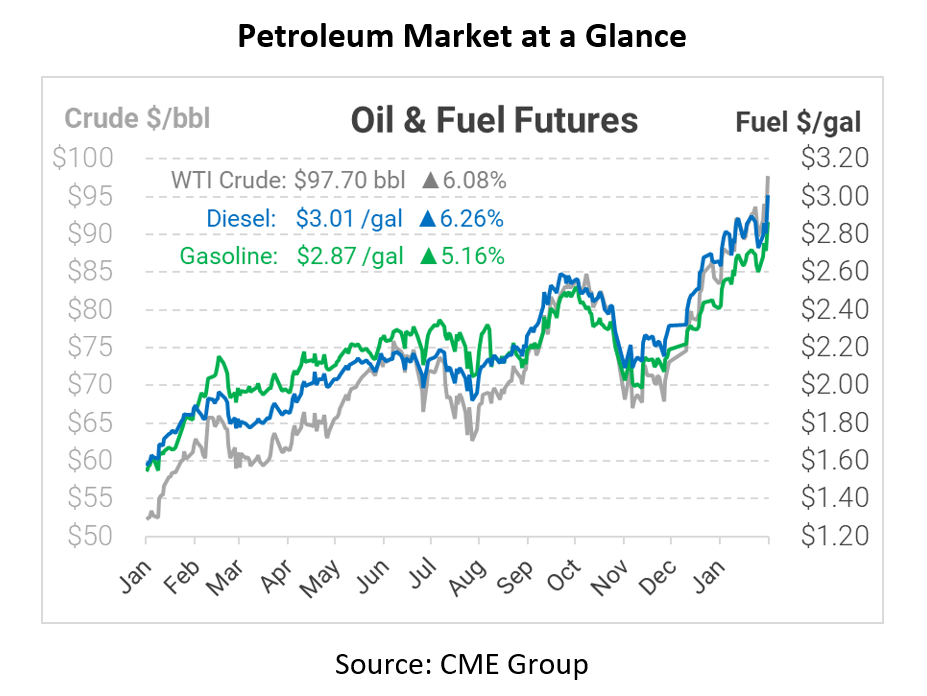
Russia Invades Ukraine – Fuel Up 20 Cents
Today is a day filled with outrage and fear – emotions permeating not just the political sphere but also the financial. With dozens of casualties reported on both sides of the Russia-Ukraine conflict, international leaders are condemning Russia for their attack and threatening tough financial sanctions. What does all this mean for fuel markets?
Markets are currently assuming a “worst-case” scenario for sanctions, meaning a complete cutoff of Russian oil supply from global markets. WTI crude briefly surpassed $100/bbl, with current gains sitting around $7/bbl. Fuel prices are up 15-20 cents per gallon. It’s rare to see prices change by such large amounts overnight; only during the most severe shocks – COVID, Saudi Arabia bombings, 2008 recession, 9/11 – have we experienced such historic moves.
Although price volatility seems inevitable, the supply impact may be less severe. Oil shortages may strike European countries, but the US has many trading partners close to home. While fuel prices will undoubtedly fluctuate, Mansfield does not expect any domestic fuel shortages tied to the Russia-Ukraine situation. Substantial price increases can bring some short-term volatility for fuel markets, as suppliers rush to keep up with fast-changing pricing dynamics and fuel trucks are spread thin seeking supply points.
What’s next for prices? Traders care about one thing right now – sanctions. Depending on the severity of sanctions imposed by Europe and the US, we could see prices continue elevating, or we might see them level off and decline. As the second-largest global producer, Russia produces 10% of the world’s oil. Depending on how sanctions are worded, Russia may be cut off from international markets (like Iran and Venezuela were) or simply cut from US and European trade. The former would be devastating for global oil prices, while the latter would cause intense short-term pain but ultimately could lead to re-routing oil flows.
Locally, the East Coast may experience some supply issues due to a pipeline outage. The Products (SE) Pipe Line, formerly known as the Plantation Pipeline, has been shut due to a possible spill in Lawrenceville, GA. So far, no restart date has been reported. The pipeline delivers 30 million gallons per day to Southeast markets – the same area supplied by the larger Colonial Pipeline. Local outages could occur depending on the length of the PPL outage.
This article is part of Daily Market News & Insights
Tagged:
MARKET CONDITION REPORT - DISCLAIMER
The information contained herein is derived from sources believed to be reliable; however, this information is not guaranteed as to its accuracy or completeness. Furthermore, no responsibility is assumed for use of this material and no express or implied warranties or guarantees are made. This material and any view or comment expressed herein are provided for informational purposes only and should not be construed in any way as an inducement or recommendation to buy or sell products, commodity futures or options contracts.






